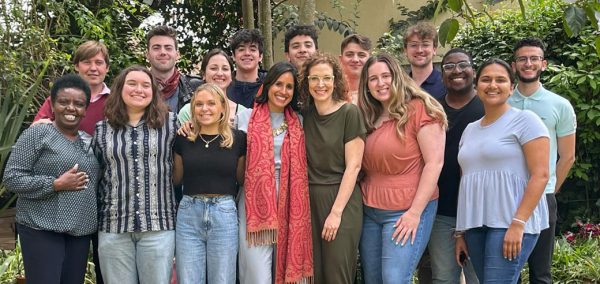
Whitman students taking part in the 2022 Kenya Cultural Immersion had the opportunity to connect lessons from class to a real-life global environment.
Fourteen Whitman School of Management students eager to experience the global economy, connect with global partners and learn the customs and culture of Africa were part of the school’s 2022 Kenya Cultural Immersion. The pilot immersion trip allowed students to connect lessons from class and apply their knowledge in a real-life global environment. The travel team was able to navigate how to become a global manager and better global citizen.
Before the Immersion
During the Spring 2021 semester, Assistant Teaching Professor Elizabeth Wimer G’06 shared with the class her own travel experiences to South Sudan and Africa, where she consulted and taught at a rural primary school. Wimer noticed that the topic led to one of the most interactive and dynamic weeks in her Managing in a Global Setting class. Through the stories and photographs she presented, students were able to make connections from what they were learning in class to what course concepts looked like in parts of the world that were not so familiar to them.
“I thought to myself, if there was that much energy in a classroom discussion, then there would be even more energy, excitement and extension of learning if I could find a way to put them on the ground in Africa,” Wimer says.
A few months later, she was able to do just that. The trip was approved in fall 2021, and the travel team hit the ground in Nairobi, Kenya, in May 2022.
All students in Wimer’s class were presented the opportunity to apply for the Kenya Cultural Immersion experience in the beginning of the Spring 2022 semester. To be selected as a member of the travel team, students had to apply and complete an interview process.
Once selected, the travel team prepared for its trip with a one-credit class at the Whitman School. Wimer had three main objectives for this course: cultural education, team bonding and logistical preparation.
“Professor Wimer prepared us with a class where we learned so much about what to expect when we arrived in Kenya. We talked about how to dress appropriately, the kind of food we would be trying and proper greetings,” says Jared Dowling ’24. “We learned a lot about cultural norms within the class, as well.”
On The Ground in Kenya
Dowling wanted to go to Kenya because he was interested in building a global connection and immersing himself in another culture. “Going abroad is one thing, but going abroad with a purpose is completely different. I wanted to make a tangible difference with the partners and the people we met on this trip,” he says.
While on the ground in Kenya, Dowling and the group were able to do just that. The week-long trip contained a packed schedule with days starting at 6 a.m. and ending around 10 p.m. It was not a vacation, Wimer emphasized. Each day was a workday, packed with opportunities to help the partner organizations, community and local refugees.
Most of the students’ time in Africa consisted of meeting with three global partners: Zaynah Khanbhai, founder of Merging Moundos and South South Women, a nonprofit that focuses on connecting the voices and experiences of the global south; Stacia Hiramine, creative communications coordinator for Tirzah Bazaar, an international nonprofit that works with artisan refugees to sell handcrafted goods; and the Child Discovery Center, a refuge and educational center for orphaned and abandoned children in Nakuru, Kenya.
Connecting with these global partners allowed the students to see firsthand how businesses function differently in another country, especially one with fewer economic opportunities, educational attainment and limited infrastructure.
During a business panel led by Khanbhai, students were given the chance to brainstorm and share ideas on bridging the divide between the Global North and the Global South relative to their generation. Through their conversations, students were able to learn more about necessary entrepreneurship from the women who shared their stories about businesses created so that they can support themselves and their families. Additionally, the travel team was able to meet local artisans and see the workshops where the goods are created for Tirzah Bazaar. From this visit, student were inspired by the stories of so many entrepreneurial dreams and aspirations the artisans had. Overall, the travel team found that the employees of these nonprofits find so much value in learning a skill set and use their skills as an entrepreneurial opportunity.
It wasn’t all business, however. When not working, the group was able to experience some tourist attractions in Kenya – going on a safari drive, watching and participating in cultural drumming and dancing, tea tasting and a visit to a giraffe center.
Back in the U.S.
The Whitman School providing a global opportunity such as this gives students a chance to see what it is like to manage business operations across diverse cultures. Students can use their education and experience through these opportunities to go out and make changes in the world while being a global manager.
“What we learn in our classes at Whitman is great and so helpful, but you cannot learn as much from a textbook as you can from experience,” says Isabella Simon ’24. “I think going on this trip to Kenya, preparing to understand other ways of life and then gaining the firsthand perspective allowed the world to become our classroom.”
Story by Anna Rooney, a junior studying marketing management and finance in the Whitman School




















Discussion about this post